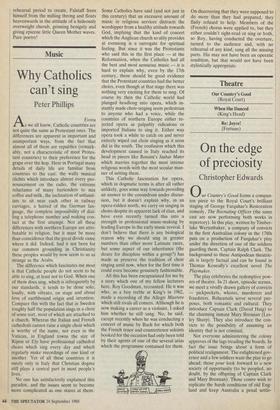Theatre
Our Country's Good (Royal Court) When She Danced (King's Head) Re: Joyce! (Fortune)
On the edge of preciosity
Christopher Edwards
Our Country's Good forms a compan- ion piece to the Royal Court's brilliant staging of George Farquhar's Restoration comedy, The Recruiting Officer (the same cast are now performing both works in repertory). In this play, written by Timber- lake Wertenbaker, a company of convicts in the first Australian colony in the 1780s puts on a production of Farquhar's play under the direction of one of the soldiers guarding them, Captain Ralph Clark. The background to these Antipodean theatric- als is largely factual and can be found in Thomas Keneally's excellent novel The Playmaker.
The play celebrates the redemptive pow- ers of theatre. In 21 short, episodic scenes, we meet a vividly drawn gallery of convicts — pickpockets, whores, murderers and fraudsters. Rehearsals serve several pur- poses, both romantic and cultural. They introduce Captain Clark (David Haig) to the charming inmate Mary Brennan (Les- ley Sharp). They also introduce the con- victs to the possibility of assuming an identity that is not criminal.
Not everyone administering the colony approves of the lags treading the boards. In fact the issue brings about a form of political realignment. The enlightened gov- ernor and a few soldiers want the play to go ahead; those pour look forward to a new society of opportunity (to be peopled, no doubt, by the offspring of Captain Clark and Mary Brennan). Those contre wish to replicate the harsh conditions of old Eng- land and keep Australia a penal settle- ment. The play opens with a flogging. It closes backstage on a wave of innocent excitement as the curtain is about to go up. Although a touch sentimental, the piece is carried along on a wave of that infectious excitement.
Martin Sherman's new play at the King's Head is about Isadora Duncan as she approaches a certain age. Set in Paris, she is very much La Duncan — living legend and force of nature. She is also, despite Sheila Gish's game and bright impersona- tion, a slightly unreal personage. What the author gives us is a slice of bohemian life lived according to a middle-American tour- ist's notion of the artistic temperament.
Genius, amusingly, does not pay its bills. Isadora sells her furniture to pay for champagne and dinner. She is highly sexed and domestically chaotic. She marries Sergei (Owen Teale), a drunken, suicidal Bolshevik poet who speaks no English, employs a Russian emigree to act as her interpreter and swoons tragically upon learning that the Russian poems so beauti- fully declaimed to her by the brute Sergei are in fact heartless commentaries on the death of her own children. She tries to bewitch an influential Italian diplomat into funding a dance school. He turns out to be a filing clerk. She is feckless, unworldly and beautiful. In fact her entire personality hovers tiresomely on the edge of preciosity and cliche.
What stops the production from toppling completely over the brink is its skilfully blended ingredients of conscious theatri- cality. The absurd, overblown effects come over (just) as part and parcel of Duncan's tragi-comic existence. Her life, you might say, is a pale imitation of the divinely inspired art that so moved her admirers. There are two key instances that capture this. First we have the emigree interpreter (brilliantly played by Angela Pleasance) giving her riveting account of Duncan on stage in St Petersburg. This is sublime. Then comes the ridiculous. A teenage Swedish Duncanette, direly imitating the great lady's art, beats the air with a display of swirls and flutters that would make even a synchronised swimmer blush. The author knows only too well that Duncan's true genius lies beyond either imitation or description. So, in this amusing but frothy piece, he invites us to make do with her salon antics instead. Tim Luscombe directs.
Maureen Lipman, on the other hand, successfully demonstrates how a great and genial English comedienne can be both described and imitated. Re: Joyce! brings to life much of Grenfell's shrewdly obser- vant comic art, including revue sketches (`Lumpy Latimer'), songs (`The Countess of Cotely'), and, naturally, a touch or two of 'George — don't do that'. The second half is less taut than the first, but this production remains recommended viewing for Grenfell admirers. Denis King is the accompanist.































































 Previous page
Previous page